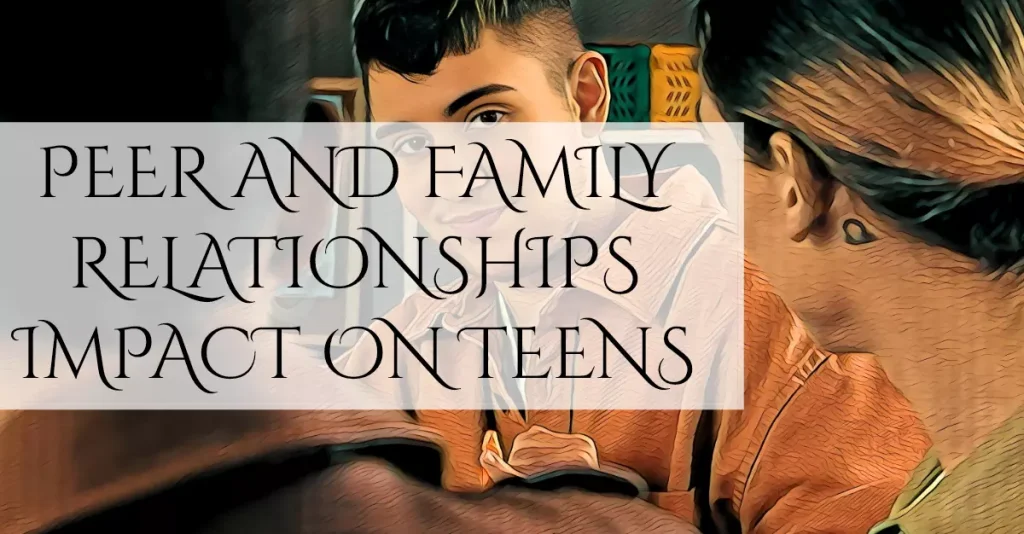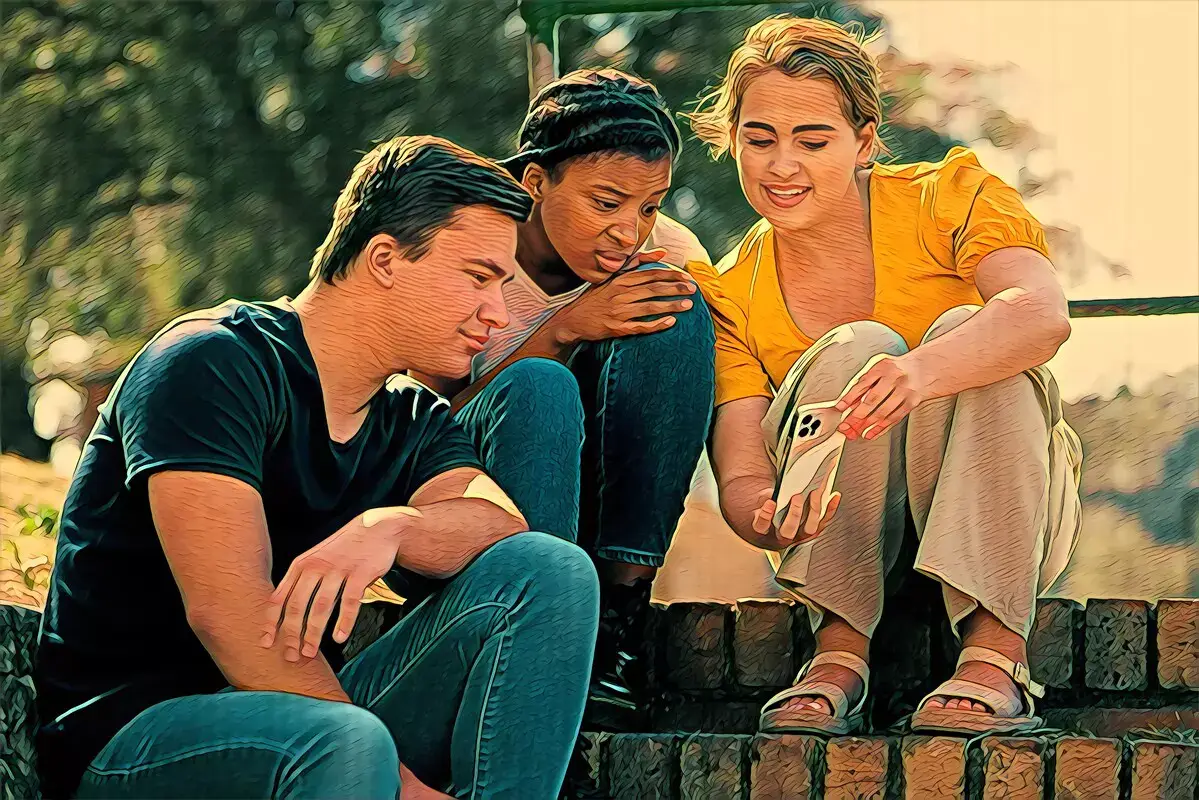9 Powerful Ways Peer and Family Relationships Impact Teens!
This blog post may contain affiliate links. If we find a product or service to be useful, we encourage you to visit the website via that link. If you make a purchase through our referral link, we may receive a commission. Rest assured, you will not be charged any additional fees. By using these links, you can support us while making your purchase. For more information visit here.
Peer and family relationships impact teens!
Welcome to our blog post, where we delve into the fascinating world of peer and family relationships and their profound influence on teenagers.
Today, we’re diving into the world of how peer and family relationships impact teens. We will examine nine impactful ways in which these connections influence the lives of teenagers.
Prepare to uncover the mysteries of how peer and family relationships impact teenagers. Get ready to find a comfortable seat!
During adolescence, individuals engage in self-exploration, develop personally, and forge enduring relationships.
In this article, we explore the significant impact these relationships have on teenagers’ emotional well-being, identity development, and overall life trajectory.
The Crucial Role of Peer Relationships
Peer relationships play a pivotal role in a teenager’s life, shaping their social skills, self-esteem, and sense of belonging. During this stage, teenagers seek acceptance and validation from their peers, often leading to the formation of close friendships.
These relationships provide a safe space for self-expression, shared experiences, and emotional support.
Having positive peer relationships can significantly enhance self-confidence, foster empathy, and promote the courage to take healthy risks. Conversely, negative relationships can lead to feelings of isolation, anxiety, and even depression.
The Influence of Family Dynamics
Family relationships are the foundation upon which teenagers build their sense of self and navigate the world around them. The quality of these relationships significantly impacts their emotional well-being, behavior, and overall development.
A supportive and nurturing family environment fosters a sense of security, trust, and open communication, allowing teenagers to explore their identities and develop healthy coping mechanisms.
Conversely, strained family relationships can lead to feelings of alienation, low self-esteem, and even rebellious behavior.
Let’s look at nine powerful ways peer and family relationships impact teens!

1. Emotional well-being and mental health
Both peer and family relationships have a profound impact on a teenager’s emotional well-being and mental health.
Positive relationships provide a sense of belonging, emotional support, and a platform for self-expression, which can enhance resilience and protect against mental health issues such as anxiety and depression.
Conversely, toxic relationships or a lack of support can contribute to feelings of loneliness, stress, and vulnerability, increasing the risk of mental health challenges.
2. Identity development and self-expression
During adolescence, teenagers embark on a journey of self-discovery and identity formation. Peer relationships offer a unique opportunity for teenagers to explore different aspects of their personalities, interests, and values.
By interacting with peers who share similar passions or have diverse perspectives, teenagers can develop a stronger sense of self and gain valuable insights into their own identity.
Family relationships also play a crucial role in this process, as they provide a foundation of values, traditions, and cultural identity.
3. Academic Performance and Achievement
Peer and family relationships can significantly impact a teenager’s academic performance and achievement. Positive peer relationships can foster a supportive learning environment, encouraging collaboration, motivation, and healthy competition.
Conversely, negative peer influences, such as peer pressure or bullying, can hinder academic progress and lead to disengagement.
Parents who are involved and supportive have a positive impact on academic outcomes by guiding, encouraging, and fostering a sense of accountability.
4. Risk-Taking Behaviors and Decision-Making
Teenagers often face challenging decisions and are more prone to engaging in risky behaviors. Peer relationships can exert both positive and negative influences on these choices.
Positive peer relationships can encourage responsible decision-making, provide guidance, and promote healthy behaviors. However, negative peer influences may lead to risky behaviors such as substance abuse, reckless driving, or involvement in delinquent activities.
Family relationships, through open communication and setting clear boundaries, can help teenagers navigate these challenges and make informed choices.
5. Social skills and communication
Developing essential social skills and effective communication heavily relies on the relationships we form with our peers. Through interactions with peers, teenagers learn to navigate complex social dynamics, resolve conflicts, and develop empathy.
Positive peer relationships can enhance communication skills, promote teamwork, and foster a sense of belonging.
Family relationships also contribute to the development of social skills, as they provide a foundation for healthy communication patterns, respect, and understanding.
6. Future Relationships and Life Trajectory
The relationships teenagers form during adolescence can have a lasting impact on their future relationships and life trajectory.
Positive peer relationships can serve as a blueprint for healthy friendships and romantic partnerships, while negative experiences may lead to difficulties in forming trusting connections.
Family relationships, particularly the quality of the parent-child bond, can shape teenagers’ ability to form secure attachments and maintain healthy relationships throughout their lives.
7. Coping Mechanisms and Resilience
Positive peer and family relationships contribute to the development of effective coping mechanisms and resilience in teens.
Supportive connections provide a safety net during challenging times, helping teens navigate stress and adversity with greater strength.
8. Values and Ethical Development
Family and peer relationships play a pivotal role in shaping a teen’s values and ethical framework.
Interactions within these relationships expose teens to different perspectives, helping them form a sense of morality and guiding principles that influence their decision-making.
9. Cultural Awareness and Diversity Appreciation
Peer and family relationships expose teens to diverse backgrounds and perspectives, fostering cultural awareness and appreciation of diversity.
This exposure helps teens develop a more inclusive worldview, preparing them for a globalized society.
I hope these points highlight the multifaceted impact that peer and family relationships can have on a teen’s overall development.
Nurturing healthy relationships
To foster positive peer and family relationships, it is essential to prioritize open communication, empathy, and mutual respect. Encouraging teenagers to surround themselves with supportive peers, engaging in family activities, and seeking professional help when needed can contribute to their overall well-being and development.
Conclusion
Family relationships are crucial for teenagers, shaping their social skills, self-esteem, and sense of belonging. Positive peer relationships enhance self-confidence, empathy, and risk-taking, while negative ones can lead to isolation, anxiety, and depression.
A supportive family environment fosters security, trust, and open communication, allowing teenagers to explore their identities and develop healthy coping mechanisms.
Both peer and family relationships significantly impact teenagers’ emotional well-being and mental health.
Understanding the importance of copyright law is absolutely vital, as it strictly prohibits any reproduction or replication of works without the explicit permission of the author. Any unauthorized duplication of content will lead to legal action for copyright infringement under Section 14 of the Copyright Act.












